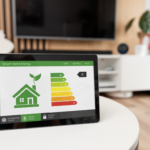Energy regulation in the UK is entering a period of transition for new homes. The long-established Standard Assessment Procedure (SAP), which assesses residential properties and produces Energy Performance Certificates (EPCs), is planned to be phased out and replaced by the Home Energy Model (HEM), a new methodology that the government intends to provide a more…
Category Archives: EPCs
Understanding U-Values: How Windows and Doors Shape Energy Efficiency in Your Home
Windows and doors do far more than bring light and access to your home, they play a major role in how well it retains heat. Their performance is measured by one key metric: the U-Value. A U-Value shows the rate of heat transfer through a material, measured per square metre for every degree of temperature…
SAP Calculations and U-Values: How They Work Together for Compliance
Energy efficiency is at the heart of modern building design. In the UK, every new build, conversion, or extension must meet strict standards under the Building Regulations, and two of the most important metrics in achieving compliance are SAP Calculations and U-Values. While both are used to assess a building’s thermal performance, they measure different…
SAP 10 vs. SAP 2012: Key Differences Developers Must Know
For over a decade, SAP (Standard Assessment Procedure) 2012 was the standard framework for assessing the energy performance of dwellings across the UK. Every developer, architect, and builder relied on it when working to comply with Building Regulations Part L and to secure a valid Energy Performance Certificate (EPC). The energy landscape, however, underwent significant…
When Is an EPC Not Required? A Guide for Commercial and Residential Property Owners
In the UK, Energy Performance Certificates (EPCs) are a legal requirement in most situations when you sell, let, or construct a property. They give buyers, tenants, and landlords an energy efficiency rating, alongside a recommendation report detailing possible energy efficiency measures to help reduce energy bills and improve comfort. However, there are certain circumstances where…
How To Save Energy At Home: 10 Simple Ways To Make Your Home More Energy Efficient
With rising energy costs and growing awareness around climate change, now is the perfect time to look at how to save energy at home. Whether you’re concerned about your gas and electricity bills, want to reduce your carbon footprint, or need to meet EPC requirements, this guide will explore 10 energy-saving tips that, together, can…
Revolutionising Fire Safety and EPC Assessments: The Future of Building Regulations
The building industry is experiencing a digital revolution that’s transforming how we approach fire safety building regulations and energy performance assessments. Modern property evaluations now require sophisticated systems that combine traditional safety protocols with cutting-edge technology. Property owners and developers face an evolving regulatory landscape where fire safety assessments must work hand-in-hand with Energy Performance…
How Much Does an EPC Certificate Cost in the UK?
Whether you’re a homeowner, landlord, or business owner, understanding the energy performance certificate (EPC) process is essential for improving your property’s energy efficiency and reducing energy bills. If you’re preparing to sell, rent, or even upgrade your property, you’ll likely need an EPC certificate, but how much does an EPC cost? In this guide, we’ll…
How To Improve Your EPC Rating: Tips for Homeowners
An Energy Performance Certificate (EPC) rates a property’s energy efficiency from A (most efficient) to G (least efficient). Improving EPC rating can help lower energy bills, increase the property’s value, and ensure compliance with rental regulations if you are a landlord. This guide outlines steps to improve your EPC rating, whether moving from E to…
What Do EPC Ratings Mean? Energy Performance Certificate Ratings Explained
If you own, buy, or rent a property in the UK, you must understand the significance of an Energy Performance Certificate (EPC) and what each rating means. This guide explains what an EPC is, defines each rating, explores property features that affect these ratings, and examines how a rating can be improved. At Falcon Energy,…










